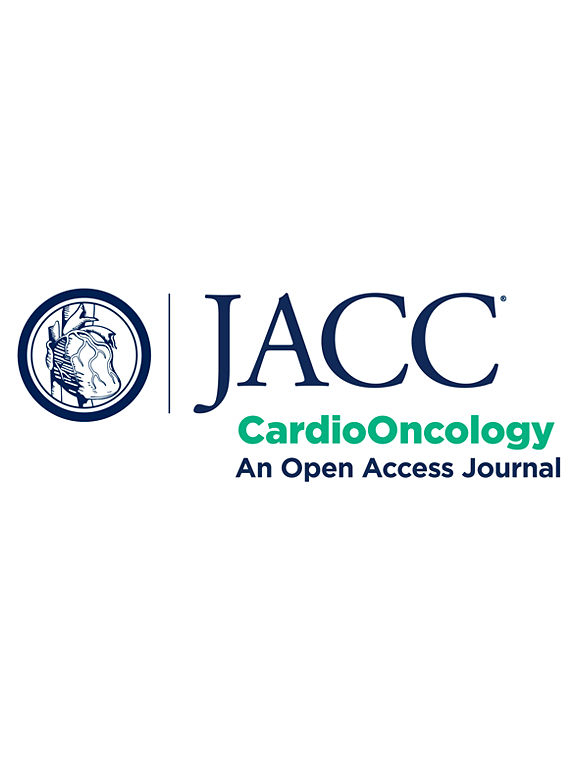氟嘧啶化疗与胃肠道肿瘤患者死亡和心血管事件的风险
IF 12.8
1区 医学
Q1 CARDIAC & CARDIOVASCULAR SYSTEMS
引用次数: 0
摘要
背景:氟嘧啶化疗是许多胃肠道肿瘤的一线治疗方法。然而,由于心脏毒性问题,心血管疾病患者通常接受替代治疗。目的:本研究旨在评估氟嘧啶治疗的全因死亡率和急性心血管事件的风险。方法:我们进行了一项观察性队列研究,应用目标试验模拟框架来关联来自虚拟心脏肿瘤学研究倡议的国家癌症、心脏和住院登记数据。被诊断为肿瘤的成年人适合以氟嘧啶为基础的化疗作为一线治疗。采用氟嘧啶为基础的化疗与其他治疗方法比较全因死亡率和急性心血管事件(急性冠状动脉综合征、心力衰竭、心律失常、心脏干预、心脏骤停和心源性死亡)住院的综合死亡率。采用调整后的加权合并logistic回归模型估计1年风险差异(RD)。结果:在103,110例患者(平均年龄69.7岁,59%为男性)中,氟嘧啶治疗患者的1年绝对死亡风险显著降低(RD: -7.7%;95% CI: -8.7%至-6.7%),急性心血管事件风险小幅增加(RD: 0.9%;95% CI: 0.0% ~ 1.9%)。这主要是由于心律失常(RD: 0.8%;95% CI: 0.1% - 1.6%)和心脏骤停(RD: 0.3%;95% CI: 0.1% ~ 0.5%),包括已存在冠状动脉疾病的患者亚组,急性冠状动脉综合征的风险没有增加。结论:氟嘧啶治疗胃肠道肿瘤患者的总生存期显著提高,显著超过心律失常和骤停的小风险。肿瘤学家在做决定时应考虑到这一点,以避免过度的临床保守主义,特别是心血管疾病患者。本文章由计算机程序翻译,如有差异,请以英文原文为准。
Fluoropyrimidine Chemotherapy and the Risk of Death and Cardiovascular Events in Patients With Gastrointestinal Cancer
Background
Fluoropyrimidine chemotherapy is administered first-line for many gastrointestinal cancers. However, patients with cardiovascular disease commonly receive alternative treatment due to cardiotoxicity concerns.
Objectives
This study sought to assess the risks of all-cause mortality and acute cardiovascular events with fluoropyrimidine treatment.
Methods
We conducted an observational cohort study applying a target trial emulation framework to linked national cancer, cardiac, and hospitalization registry data from the Virtual Cardio-Oncology Research Initiative. Adults diagnosed with tumors eligible for fluoropyrimidine-based chemotherapy as first-line therapy were included. All-cause mortality and a composite of hospitalization for acute cardiovascular events (acute coronary syndrome, heart failure, cardiac arrhythmia, cardiac intervention, cardiac arrest, and cardiac death) were compared in patients treated with fluoropyrimidine-based chemotherapy vs alternative management. Adjusted, weighted pooled logistic regression models were used to estimate the 1-year risk difference (RD).
Results
Among 103,110 patients (mean age 69.7 years, 59% male), the absolute risk of death at 1 year was significantly lower in fluoropyrimidine-treated patients (RD: −7.7%; 95% CI: −8.7% to −6.7%) with a small increased risk of acute cardiovascular events (RD: 0.9%; 95% CI: 0.0% to 1.9%). This was primarily due to arrhythmias (RD: 0.8%; 95% CI: 0.1% to 1.6%) and cardiac arrest (RD: 0.3%; 95% CI: 0.1% to 0.5%), with no increased risk of acute coronary syndromes including in the subgroup of patients with pre-existing coronary artery disease.
Conclusions
The markedly improved overall survival with fluoropyrimidines in patients with gastrointestinal cancer significantly outweighs the small risk of cardiac arrhythmia and arrest. Oncologists should take this into consideration for decision making to avoid undue clinical conservatism, particularly in patients with cardiovascular disease.
求助全文
通过发布文献求助,成功后即可免费获取论文全文。
去求助
来源期刊

Jacc: Cardiooncology
Multiple-
CiteScore
12.50
自引率
6.30%
发文量
106
期刊介绍:
JACC: CardioOncology is a specialized journal that belongs to the esteemed Journal of the American College of Cardiology (JACC) family. Its purpose is to enhance cardiovascular care for cancer patients by publishing high-quality, innovative scientific research and sharing evidence-based knowledge.
The journal aims to revolutionize the field of cardio-oncology and actively involve and educate professionals in both cardiovascular and oncology fields. It covers a wide range of topics including pre-clinical, translational, and clinical research, as well as best practices in cardio-oncology. Key areas of focus include understanding disease mechanisms, utilizing in vitro and in vivo models, exploring novel and traditional therapeutics (across Phase I-IV trials), studying epidemiology, employing precision medicine, and investigating primary and secondary prevention.
Amyloidosis, cardiovascular risk factors, heart failure, and vascular disease are some examples of the disease states that are of particular interest to the journal. However, it welcomes research on other relevant conditions as well.
 求助内容:
求助内容: 应助结果提醒方式:
应助结果提醒方式:


